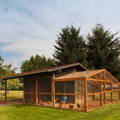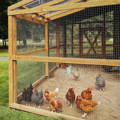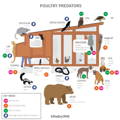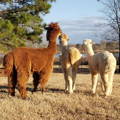
How to Predator Proof Your Backyard Chicken Coop
Protect your flock with our comprehensive guide to predator-proofing your chicken yard. Discover effective strategies and practical measures to safeguard your chickens from predators. Keep your feathered friends safe and secure with expert tips.
FUN FACT: Foxes outperform dogs in almost every category, including problem solving, memory recall, spatial reasoning and general intelligence.
Subscribe
To join our mailing list and never miss an update!
Raising backyard chickens is a rewarding and enjoyable experience, providing fresh eggs, organic pest control, and a connection to nature. However, the safety of your flock is paramount, as predators pose a constant threat. To ensure the well-being of your chickens, it is crucial to predator-proof your chicken yard.
This comprehensive guide will provide you with essential strategies and practical measures to protect your flock from potential predators. By implementing these steps, you can create a secure and nurturing environment that allows your chickens to thrive.

UNDERSTANDING COMMON PREDATORS
Before fortifying your chicken yard, it's important to familiarize yourself with the predators that pose a threat to your flock. Common predators include raccoons, foxes, coyotes, opossums, skunks, rats, snakes, birds of prey (such as hawks and owls), and even domestic pets like dogs and cats.
Each predator exhibits distinct behaviors and strategies when hunting chickens. For instance, raccoons are notorious for their dexterity and ability to open latches, while snakes can slither through small openings. By understanding the specific threats posed by each predator, you can tailor your defense mechanisms accordingly.
The diagram below provided by Poultry DVM is an excellent model of the primary poultry predators and their specific characteristics.

SECURE THE PERIMETER
The first line of defense is securing the perimeter of your chicken yard. Start by installing a sturdy fence that extends at least one foot into the ground to prevent digging. Consider using hardware cloth with small openings (around 1/2 inch) instead of chicken wire, as it offers better protection against small predators like rats and snakes. Ensure the fence is tall enough to deter jumping predators and that it extends below ground level to prevent burrowing.
Inspect the fence regularly for any signs of wear or damage, and promptly repair any weak spots or holes. Pay attention to the ground as you perform your routine fence check for scat (aka poop) droppings left by predators who may be testing your security for acesss to your flock. Clear vegetation around the fence line to eliminate hiding places for predators and reduce the risk of aerial attacks from birds of prey.
If your flock is not confined to an outdoor run during the day, you will need to consider protecting them from birds of prey. The two most common are hawks and owls. We recommend using fishing line, strung in rows 12 inches apart, between two fixed items such as sheds or fences to create a barrier to flying predators. Fishing line is a great choice because it is strong, very effective and virtually invisible to the human eye so it doesn’t deter from the visual appeal of your chicken yard.
If a fishing line barrier does not fit your design layout, you should always provide canopies, benches or anything that the chickens can escape to for cover if a bird of prey is circling above.

IMPLEMENT LIGHTING AND VISIBILITY
Predators are less likely to approach well-lit areas, so ensure your chicken yard has sufficient lighting. Install motion-activated lights around the perimeter of the coop and the yard to deter nocturnal predators.
Solar powered motion-sensor lights will startle predators, making them think twice before approaching. Consider installing predator-deterrent devices like reflective surfaces, scarecrows, or predator decoys strategically throughout the yard.
It is worth nothing that many predators such as foxes and racoons are clever enough to figure lighting tricks out. This should not be your main defensive strategy, but an addition to your predator-proofing efforts. We have found the lighting to be more of an advantage to us being able to see a predator, than an actual deterrant to predators.
REGULAR MONITORING & MAINTENANCE
Vigilance is key to maintaining a predator-proof chicken yard. Conduct regular inspections of the fence, coop, and surrounding areas for any signs of potential breaches. Look for evidence of digging, gnawing, or attempts to access the coop.
Regularly trim trees or shrubs near the fence line to prevent predators from using them as launching points. Keep the yard clean and free from debris, as this reduces hiding spots for predators and minimizes the risk of infestation by vermin.
If you notice that your hens are not laying eggs all of sudden, this may be a sign that a predator is visiting and has them upset or that a predator is visiting and stealing eggs. Either way, an abnormal stop in egg production is usually a good sign that something is not quite right in the hen house.

Trending Articles
CONSIDER LIVESTOCK GUARDIAN ANIMALS
Introducing livestock guardian animals (LGAs) to your chicken yard can provide an additional layer of protection. Dogs, in particular, are renowned for their ability to deter predators and alert you to potential threats. Select a breed known for its compatibility with chickens and train them to coexist peacefully with your flock.
LGAs, such as llamas or donkeys, can also be effective at deterring predators, especially larger ones like coyotes or dogs. However, it's important to carefully introduce LGAs to the flock and monitor their interactions.
Because we also keep alpacas and emus on Gypsy Shoals Farm, we have located the chicken keeping area within the boundaries of their pasture in order to capitalize on the natural protection they provide from predators entering our pasture.

THE TAKEAWAY
Trending Products
Copyright©2023 All rights reserved. We love to have you share our article as long as you include a direct link to this page. Please contact us for permission and we’ll be happy to collaborate. This article or any portion thereof , including all images, may not be reproduced or used in any manner whatsoever without the express written permission of Gypsy Shoals Farm.



